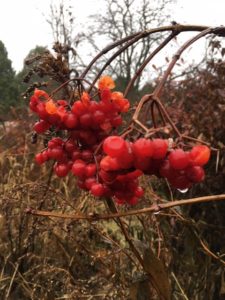Thanksgiving
The years certainly fly by, and sometimes it’s hard to comprehend their passage. Forty five Thanksgivings ago a group of local people decided there would be a Woodland Dunes, and took steps to buy land and organize environmental education programs. Their decisions were driven by a desire to help nature and teach about it, not the desire for financial gain. They raised funds and purchased wooded swampland near Lake Michigan – land that couldn’t be farmed and shouldn’t be developed, yet was full of wildlife and accessible from both Manitowoc and Two Rivers. The land had seen many uses from pasturing, to mink farming, to logging and hunting, to some farming. Released from those uses, it quickly rebounded into the shrubby and forested wetlands that originally covered the ground. Tens of thousands of birds were caught, banded, and released. From this we learned how important are the habitats along Lake Michigan to migrating wildlife. Few people realized that saw-whet owls migrated through here until our banding efforts revealed hundreds moving through each fall. We are thankful that our founder and those who helped him had the foresight to purchase the land, establish the preserve, and develop programs that would help educate hundreds of thousands of people.
We are thankful for all the people who have come forward to help – from those involved in the formation of the organization to those who continue to come forward to teach, maintain, and financially sustain our place. About 300 people each year volunteer to help, and there’s no doubt that we could not run Woodland Dunes without them. Our small staff would only be able to provide a fraction of what it takes to manage a 1,500 acre nature preserve while providing programs for more than twice that many people. And still do a bit of wildlife research so that we can track what lives here.
But most of all, I am thankful for the wildlife itself. Even though the chickadees that actively visit the feeders look lively and happy, theirs is not an easy life. And people seem to continuously make things more challenging for wildlife: fragmenting the forests, eliminating wetlands, introducing unfamiliar foreign diseases, plants, insects, and chemicals into our habitats- even changing the climate itself. Wildlife always pushes itself into new territories and beyond its comfort zone. There are a number of animals that I remember from my youth that used to live here. Sadly, they are no longer found here. As a result, every northern shrike or sandpiper or gentian flower or weasel seen in the woodpile is a cause to be thankful. From our experience, if you give wildlife a chance it will often respond. Hopefully, that’ll be the case until we fully get our act together in terms of our environment.
The good news is we are coming to realize that what is good for nature is good for our nature as well. Where do we like to spend free time when we need to “recharge”? Often it’s by the Lake, or heading “Up North.” We fish, hunt, walk, bike, swim, and feel better for it. We need to appreciate that, be thankful for it. We are powerful, and more than ever have the ability to take better care of the land and water that sustain us, and the living things that share our surroundings. In doing so, we can make our Thanksgivings more happy and full of gratitude.
photo- wild American highbush cranberries at Woodland Dunes

